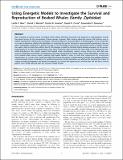Using energetic models to investigate the survival and reproduction of beaked whales (family Ziphiidae)
Abstract
Mass stranding of several species of beaked whales (family Ziphiidae) associated with exposure to anthropogenic sounds has raised concern for the conservation of these species. However, little is known about the species’ life histories, prey or habitat requirements. Without this knowledge, it becomes difficult to assess the effects of anthropogenic sound, since there is no way to determine whether the disturbance is impacting the species’ physical or environmental requirements. Here we take a bioenergetics approach to address this gap in our knowledge, as the elusive, deep-diving nature of beaked whales has made it hard to study these effects directly. We develop a model for Ziphiidae linking feeding energetics to the species’ requirements for survival and reproduction, since these life history traits would be the most likely to be impacted by non-lethal disturbances. Our models suggest that beaked whale reproduction requires energy dense prey, and that poor resource availability would lead to an extension of the inter-calving interval. Further, given current information, it seems that some beaked whale species require relatively high quality habitat in order to meet their requirements for survival and reproduction. As a result, even a small non-lethal disturbance that results in displacement of whales from preferred habitats could potentially impact a population if a significant proportion of that population was affected. We explored the impact of varying ecological parameters and model assumptions on survival and reproduction, and find that calf and fetus survival appear more readily affected than the survival of adult females.
Citation
New , L F , Moretti , D , Hooker , S K , Costa , D P & Simmons , S E 2013 , ' Using energetic models to investigate the survival and reproduction of beaked whales (family Ziphiidae) ' , PLoS One , vol. 8 , no. 7 , e68725 . https://doi.org/10.1371/journal.pone.0068725
Publication
PLoS One
Status
Peer reviewed
ISSN
1932-6203Type
Journal article
Collections
Items in the St Andrews Research Repository are protected by copyright, with all rights reserved, unless otherwise indicated.

